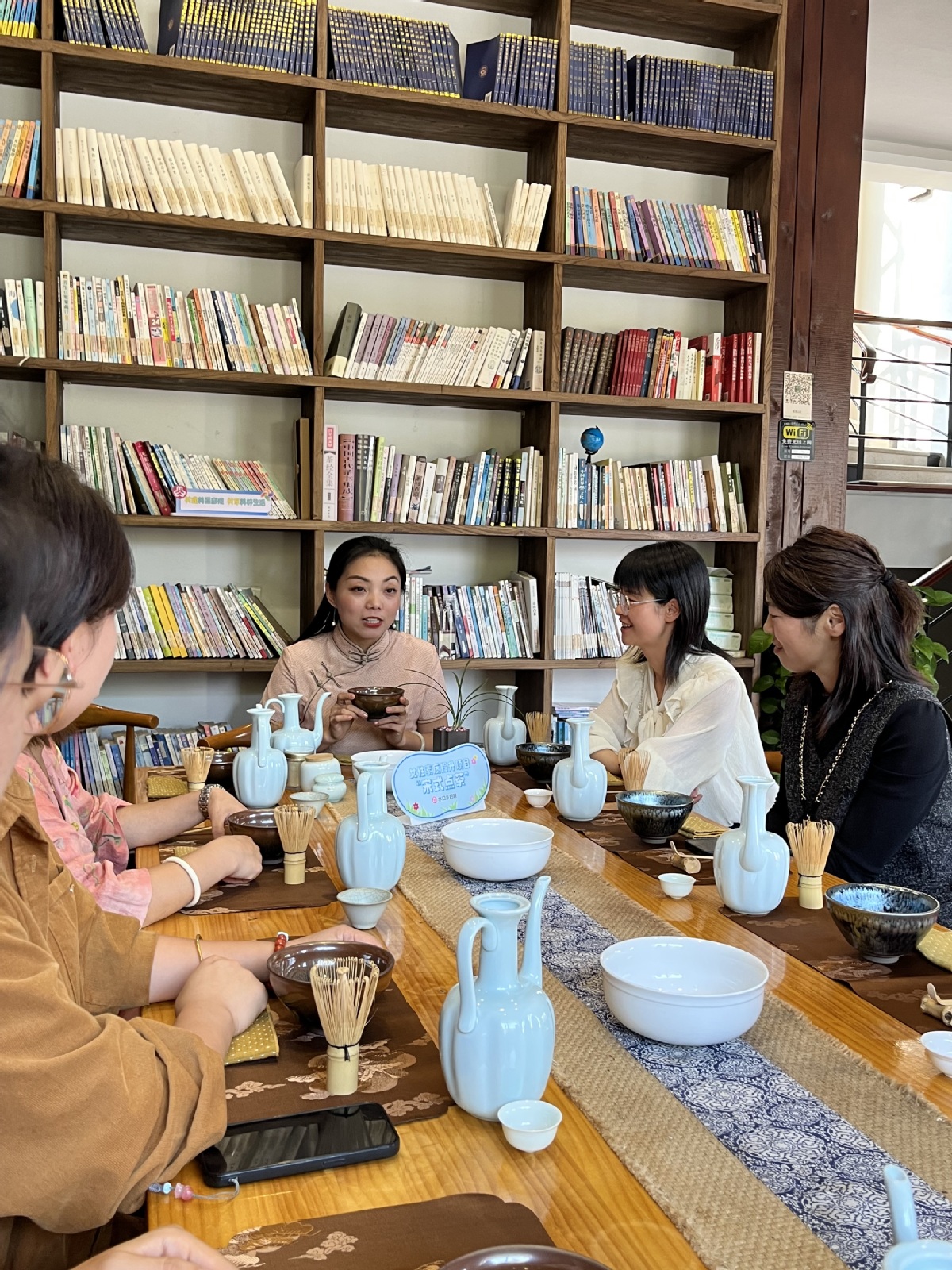
The Zisun tea ritual is a highlight during any stay at Xu Dan's rural abode in Changxing county of Huzhou, Zhejiang province.[Photo provided to China Daily]
Tucked away amid towering trees in Shuikou village, Xu Dan's homestay attracts an uninterrupted flow of urban residents seeking serenity and tradition.
At the main courtyard of her rural abode in Changxing county of Huzhou city in East China's Zhejiang province, lies a tranquil pool so clear that it resembles a mirror of the sky, with a small wooden boat gently drifting.
Arched stone bridges span the water to link scattered courtyards and winding paths that meander through miniature artificial mountains, each rock carefully placed to echo the harmony of classic Chinese gardens.
Tea artisans in flowing robes perform age-old rituals — steeping, pouring, and presenting the tea with graceful movements.
Guests are welcomed not only with warmth but also a ceremonial tea treat: a trio of flavors, each steeped in meaning.
"The sweet tea, crafted from fragrant osmanthus blossoms and delicate tangerine slices, symbolizes an abundant and joyful life. The salty tea is a mix of smoked beans, dried carrots, sesame seeds, orange peel, and crushed tea leaves that honors the toil of harvest and the earth's richness," Xu says as she warmly welcomes guests in late April.
Finally, the plain tea, simple and pure, lingers with a fresh aftertaste that evokes the essence of true friendship — like plain tea, friendship should be honest and unadorned, needing no embellishment to be deeply appreciated, she explains.
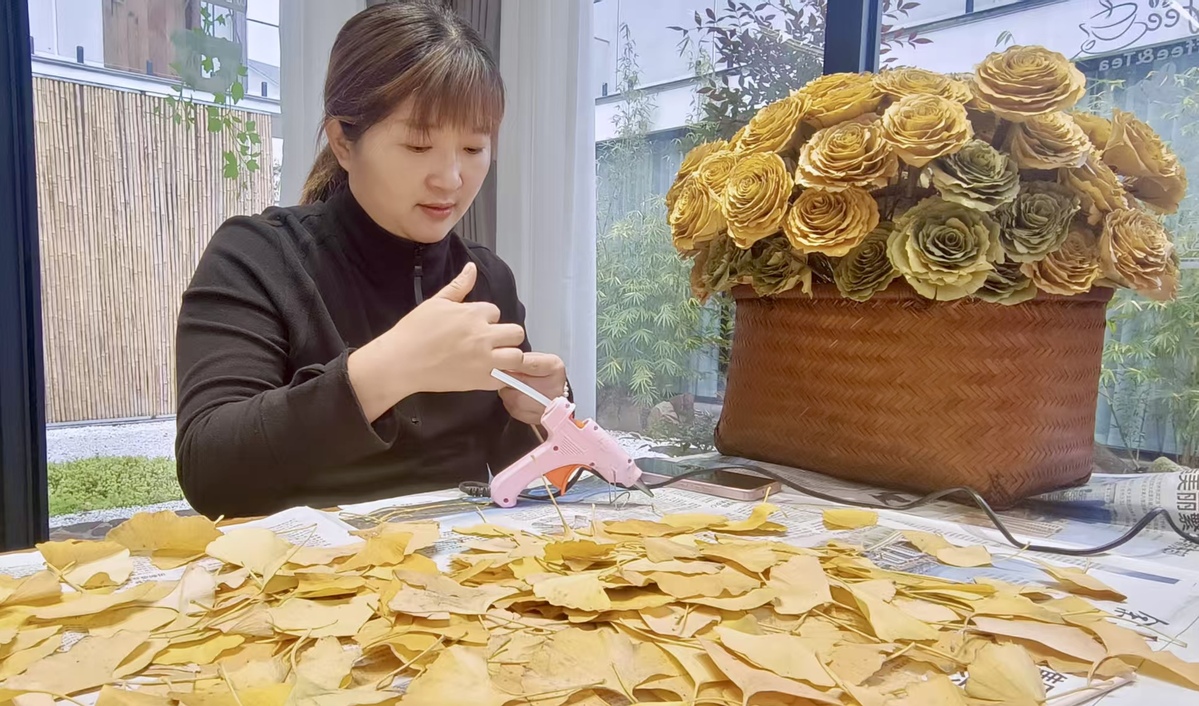
Flowers shaped from gingko leaves are popular with guests at Xu Xianfeng's homestay in Changxing.[Photo provided to China Daily]
"Guests have shown a strong desire to pay more for the tea experiences we arrange," Xu says.
Born and raised in the village, the woman in her 30s started blending her homestay with intangible cultural heritage, particularly tea culture, in 2023.
"This idea came about because my uncle is a national-level inheritor of the local tea-making craft and its profound history," she explains.
Zisun tea originates from Changxing and boasts a history of over 1,200 years. It used to be highly prized and designated as an imperial tribute tea during the Ming Dynasty (1368-1644).
Crafted through meticulous traditional techniques, Zisun tea is distinguished by its fine, tender buds, subtle purplish hue, and shape resembling bamboo shoots — hence its name, which means "purple bamboo shoot" tea.
To integrate tea culture into the guest experience, Xu pays attention to the environment and activities.
"Each of the 16 rooms in two buildings is stocked with Zisun tea and has a designated tea-tasting area," she says.
"On every floor, there are books about tea and collections of essays from local authors. Guests can enjoy tea while reading, which creates a quiet, immersive experience."
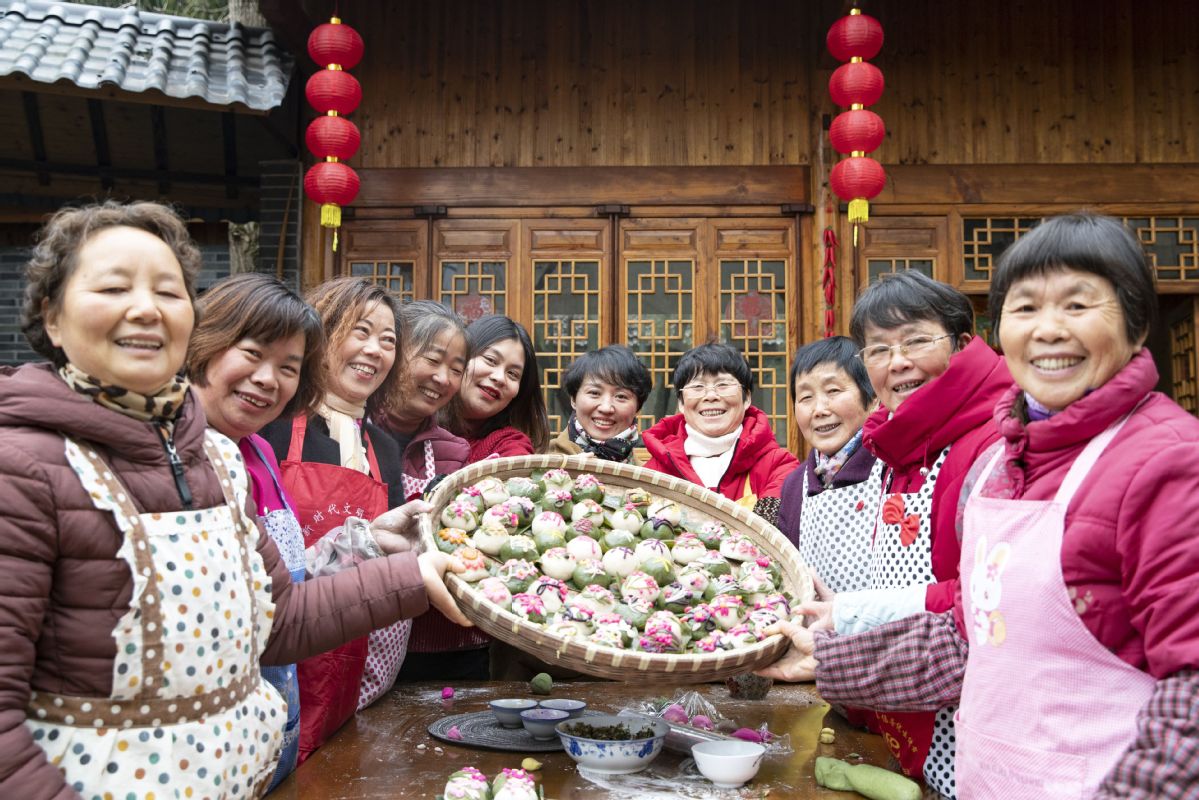
Changxing villagers showcase glutinous rice pastry infused with flower petals.[Photo provided to China Daily]
She also hosts interactive events to deepen visitors' engagement.
"I organize activities like Song Dynasty (960-1279) tea-whisking demonstrations, tea cake-making workshops, and modern tea-blending sessions," she says.
Currently, it's tea-picking season and guests can participate in harvesting the leaves.
The tea culture theme has noticeably upgraded her business.
The homestay has been a family business since 2014, when her mother opened a farmhouse-style inn. It evolved into a fine agritourism experience when Xu took over in 2018 after quitting her product development job in Hangzhou, the provincial capital.
"I saw huge growth potential and wanted to incorporate my creative ideas into traditional culture," she says.
Her efforts in cultural enhancement have improved the homestay's overall quality, which has brought guests of diverse backgrounds.
"Previously, most of my visitors were elderly," she says.
"Now, we're seeing more families and younger seniors. The guests have a greater awareness of culture," she notes.
Her homestay is among more than 500 in the village, many of which have cashed in on the integration of rural culture and tourism over the years.
"Nearly every household is involved. This makes it the largest rural tourism cluster in northern Zhejiang," says Zhang Yuhua, the first secretary of the rural homestay industry association in Shuikou. The village attracted over 4.5 million visitors last year, generating about 1.5 billion yuan ($205.6 million) in tourism revenue.
Most visitors come from major cities within a two-and-a-half-hour drive from Changxing, including Shanghai and Hangzhou, as well as Nanjing in Jiangsu province.
Homestays have evolved with tourists' preferences, considering emotional value or how the experience makes visitors feel, says Zhang.
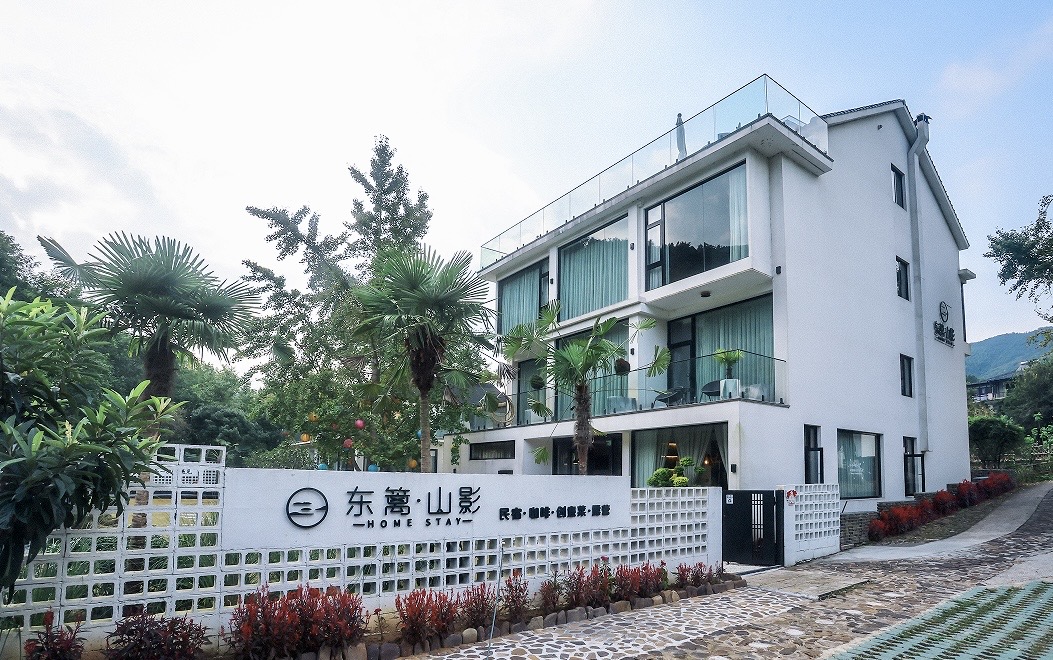
Another homestay offers creative local cuisine and camping in Changxing. [Photo provided to China Daily]
In addition to popular in-house entertainment like poker and karaoke, villagers have connected nearby scenic spots within a 1.5-hour radius.
"Guests stay and eat in Shuikou, but we help them explore the surrounding areas," Zhang says, adding that the arrangement attracts many visitors to stay for at least three days.
The diverse themes have added richness to Shuikou's rural tourism tapestry.
"Each place has its unique characteristics, which makes Shuikou a sustainable and beloved destination," he says.
About a three-minute walk from Xu's place, Xu Xianfeng's homestay was built after he decided to imbue his operations of ginkgo elements in 2020 when business was halted due to the COVID-19 pandemic.
The transformation was more than cosmetic. It was built around a deep connection to local culture and natural resources.
"We're surrounded by ginkgo trees, so the theme of our homestay is all about ginkgo: its flowers, photo albums, leaves, and more," Xu Xianfeng explains.
Even the food and drinks reflect this theme.
"We serve ginkgo milk tea and ginkgo fruit powder hand-prepared by my wife. They're free not only for our guests but also anyone who dines with us," he says.
As he welcomes visitors to the homestay, he enthusiastically shares samples of the local yearround offerings, ranging from dried ginkgo nuts and bamboo shoots to peanuts.
The themed experiences tug at the heartstrings of urban travelers, many of whom have shared their experiences on social media platform Xiaohongshu, also known as RedNote, which helps attract more visitors.
The seven rooms of his homestay and the dining room were at full capacity during the May Day holiday.
"Over 80 percent of our guests are families with children. When kids get a change of scenery, they put their phones down because they can engage with nature all day," Xu Xianfeng notes.
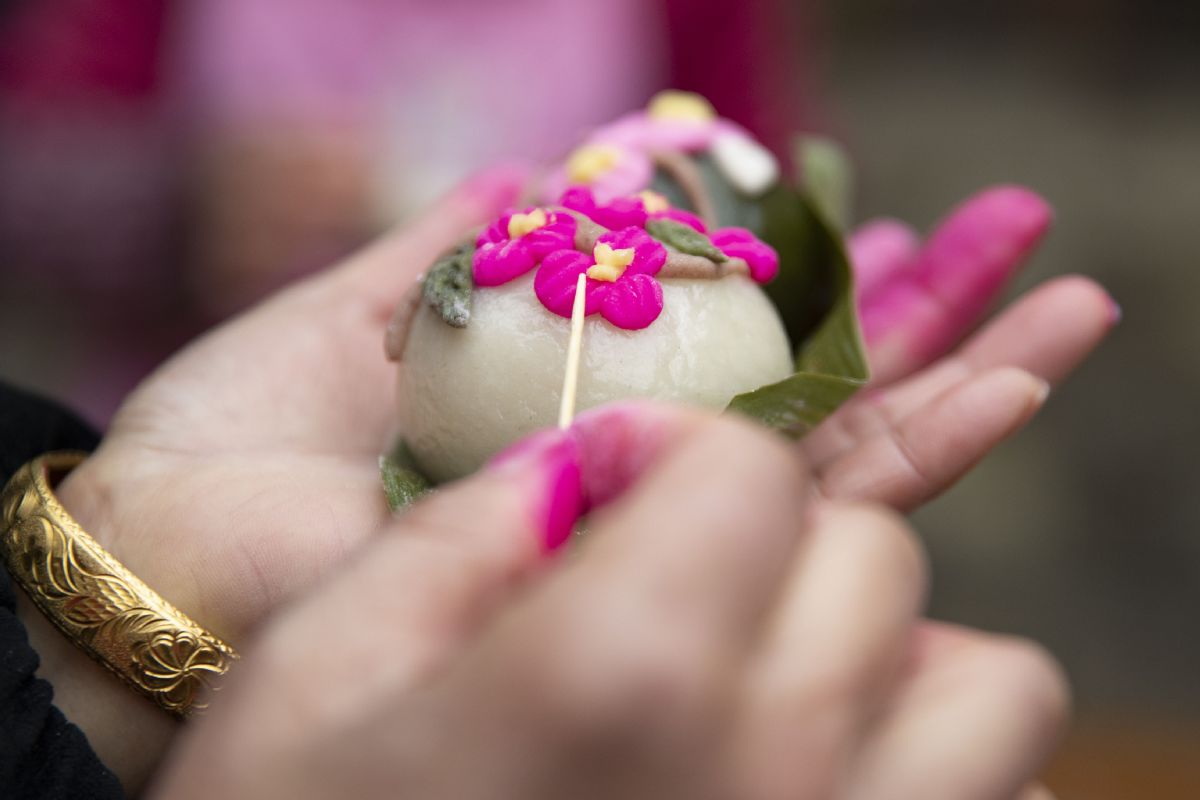
A visitor experiences making pastry.[Photo provided to China Daily]
One of the most popular cultural experiences he offers is making ginkgo leaf picture frames.
"We use flower preservatives so the ginkgo leaves stay vibrant for up to two months. The guests say they acquire a sense of belonging to nature," he says.
The homestay has attracted a loyal following.
"Last year, a guest tried making a ginkgo flower project but failed, so I gave her one of ours. She was really touched and came back this year with her friends," he says.
This kind of emotional connection, he says, is "what makes the work fulfilling".
Looking forward, Xu Dan, the owner of the tea-themed homestay, says she plans to create more youthoriented spaces and collaborate with more educators to run a family-style study program that taps deeper into the history and craft of Zisun tea.
"I'm developing a leisure zone tailored for younger people with activities like camping and barbecuing," she explains.
"As the number of young visitors to our village rises, I want to offer meaningful experiences," she says.
 Editor:Qiu Xiaochen
Editor:Qiu Xiaochen